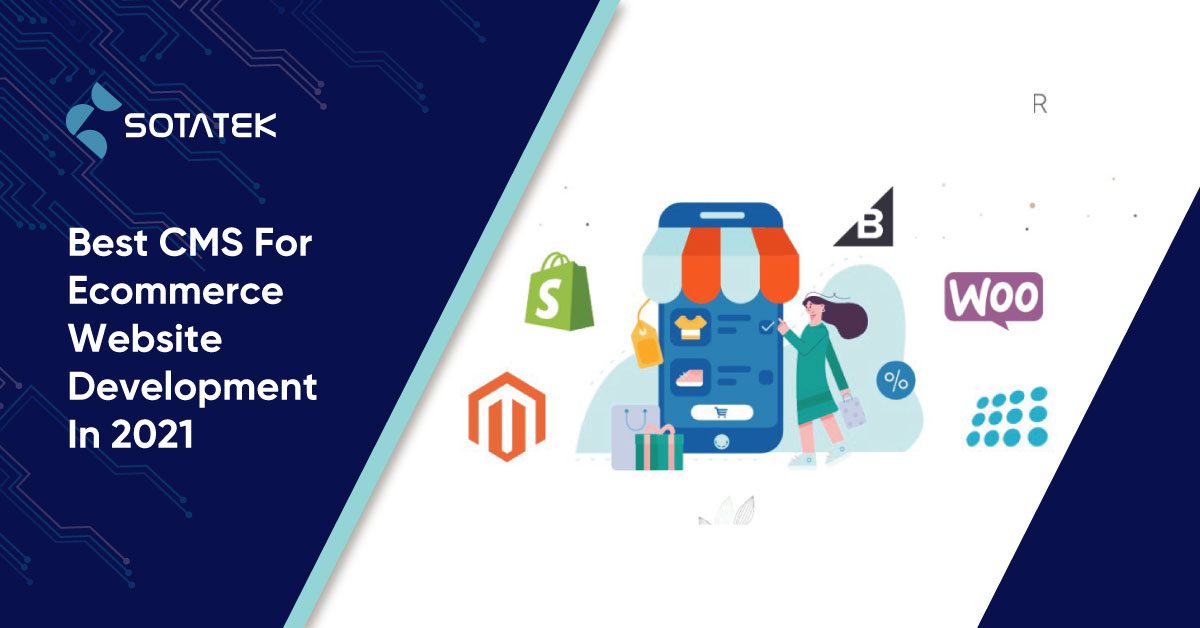
The global pandemic and social distancing have magnified the growth of eCommerce, with online shopping currently accounts for almost 15% of all retail purchases worldwide and is predicted to reach 23% by 2025. If you are considering stepping into the golden era of eCommerce by establishing your own online store, researching CMS, which serves as excellent Ecommerce Website Development Platforms, would be a great place to start with.
1. What is CMS?
You might have heard of CMS - a popular abbreviation for Content Management System, which has become extremely important for businesses in this digital era. CMS allows users to create, modify, and manage content on digital platforms at ease without specialized technical expertise. CMS is typically used for website content management and enterprise content management.
Essential benefits of CMS for eCommerce
- CMS’ main features can include, yet are not limited to the following:
- Built-in SEO analysis and recommendations
- Manage web content versions
- Customize and change template designs
- Minimum coding requirements
- Integrate audit logs

CMS is typically used for website content management and enterprise content management.
And many other wonderful functions, depending on the website development platform that you choose to deploy. With all these features, CMS can add significant benefits to your enterprise:
- Scalability: eCommerce website development platform serves as an excellent eCommerce solution for businesses of all sizes, from small startups to large corporations, as the system brings about flexibility and simplicity in building and develop Ecommerce platforms.
- Smooth Integration: With CMS, information can be updated easily and integrated throughout your website at ease.
- Accessibility: CMS can be accessed from anywhere and by multiple devices, allowing enterprise managers to work efficiently and update content timely, without the hustle of several technical requirements.
2. Best CMS for eCommerce Website Development in 2021
a. Magento
Magento is one of the most commonly used open-source eCommerce platforms. This PHP-based system allows developers to build their online stores at ease, catering to several business requirements such as Omnichannel, Mobile Commerce, B2B platforms, etc.; third-party extensions can also be integrated into Magento eCommerce sites for a better retail experience.
With all of its extensive offerings, Magento has successfully attracted over 300,000 developers worldwide to its community, handling 100 million dollars gross merchandise volume every year.
Pros of Magento:
- Highly customizable functionality
- Advanced reporting features
- Available scaling solutions
- Rich in features
- SEO-friendly and fast loading speed
- Strong developer community - easy access to Q&A/support
Cons of Magento:
- Requires some preliminary technical knowledge
- Comparatively expensive
- Demands hosting for websites
b. Shopify
By March 2021, Shopify had reached over 1 million users, with thousands of businesses worldwide, as a highly trusted eCommerce website development platform. Shopify is often regarded as an all-in-one stop for E-commerce businesses, where managers can customize their websites, set up their own online stores, manage customer databases, update new contents, and several other extensive features. Shopify can meet business needs, ranging from Sales, Marketing to Payment and Customer Relationship Management.
Another reason for Shopify’s popularity must be the convenience that it brings about when it comes to managing stores. With Shopify, store owners can track, modify and manage content as well as data anywhere, simply from their mobile devices.
Pros of Shopify:
- Customizable storefront and template themes
- Full access to the HTML and CSS of the website
- Full-featured CMS
- Gift cards/ Discounts/ Mobile Shopping cart functions are available
- Allow own domain name
- Fulfilling multiple orders at once.
- Integrated social media accounts
- 24/7 support
Cons of Shopify:
- Fewer functionalities compared to other platforms
- Limited phone support
- Themes and updates require extra payments
c. WooCommerce
According to the latest statistics, WooCommerce accounts for almost one-third of the eCommerce market as of January 2021 - making it the top Ecommerce site. Over 4.4 million websites are using the WooCommerce plugin worldwide.
WooCommerce transforms a simple word-press website into an online store within a few clicks, together with its wide range of extensions and themes, all free for its users. With this model, businesses can get the best of both worlds, from extensive functions of WooCommerce and support of the tremendous community of WordPress users.

WooCommerce supports the tremendous community of WordPress users.
Pros of WooCommerce:
- WooCommerce acts as a free plug-in for WordPress
- Easy to navigate and customize
- SEO- friendly
- Multiple free features and extensions
- Unlimited products
- Familiar with WordPress users
Cons of WooCommerce:
- Need to pay for hosting and domain separately
- Require knowledge of both WordPress and WooCommerce
- Only work with WordPress themes
d. BigCommerce
Among several options, BigCommerce is worth considering software to start your eCommerce business. BigCommerce is currently supporting over 60,000 merchants around the world, of all industries and business sizes. BigCommerce can meet both the extensive, scalable demand of large enterprises to the expectations of simplicity from small businesses.
The platform is widely known for its advanced SEO features and the capability to integrate other CMS solutions or connect with various types of software while leveraging BigCommerce shopping cart.
Pros of BigCommerce:
- Wide variety of theme options
- Fast loading speed
- Active customer services
- Multiple extensions and apps
- Easy integrations with other platforms or types of software
- Unlimited staff accounts
Cons of BigCommerce:
- Comparatively expensive packages
- Limited annual online sale
e. PrestaShop
PrestaShop is a freemium platform with a MySQL Data management system and extensive backend codes. With huge adds-on and theme options, users can build their own online stores at ease, with little to no technical knowledge requirements.
According to the PrestaShop statistic, over 300,000 e-businesses worldwide using its technology
Pros of PrestaShop:
- Easy to customize features and themes
- Easy installation and configuration
- Friendly for non-technical users
- Free, open-source shopping cart
Cons of Prestashop:
- Limited Scalability
- No official built-in support team
- Expensive plug-ins
Stepping into the competitive world of eCommerce would require extensive research and preparation, and choosing the right eCommerce website development platform is also an important part of this journey. To tell which CMS would be the best fit demands thorough knowledge of both the business model and expectations, therefore you as a manager would be the one who knows best.
We hope this article has provided you with essential information on the general idea of CMS platforms and some possible options. There are many companies offering to outsource website development services, but
Among numerous businesses, only the best web development company provides cost-effective outsource website development services. As a Leading US web development company offering top-notch CMS development services, SotaTek also has skilled and experienced Shopify web developers to make your website appealing with new and advanced features. If you are looking for more advanced and customized CMS to guarantee better management and control of products and services to enhance your workplace efficiency, increase security, make data easily accessible, and optimize your store performance, do not hesitate to contact SotaTek’s talented team of experts.



